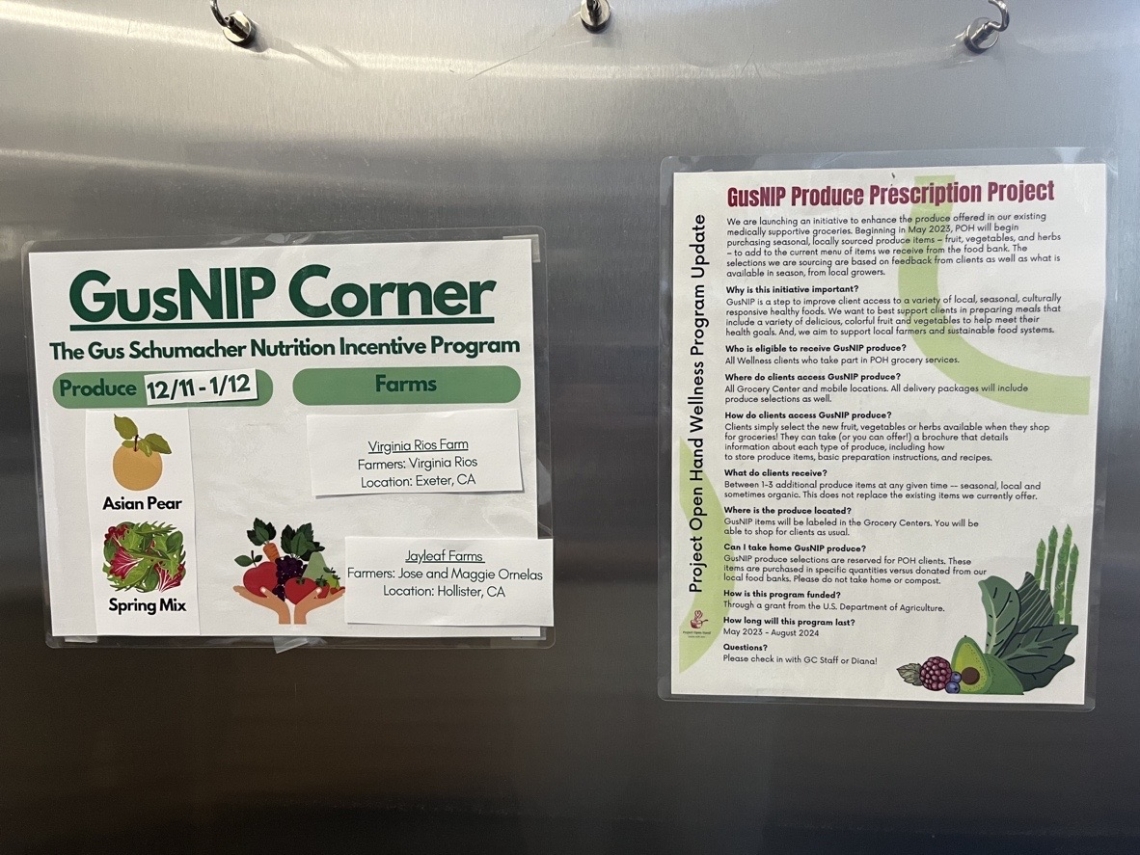
Clients have been sharing how excited they are about all the fresh produce they can now find in the Project Open Hand grocery centers. That’s an immediate result of the produce prescription program that Project Open Hand started in mid-2023 with funding from the Gus Schumacher Nutrition Intervention Program (GusNIP).
A nationwide initiative that includes over 225 projects, GusNIP is focused on providing incentives to purchase fresh fruit and vegetables. At Project Open Hand, we’re using it to increase access to high-quality, California-grown, and culturally appropriate produce to improve the health of our clients.
Developed in partnership with UC San Francisco, the produce prescription allows clients to receive weekly grocery packages that include fruit, vegetables, and herbs purchased from local farms and prescribed by healthcare providers. Produce intake and its impact on the health of clients is then measured and evaluated on a regular basis by providers.
“This is a critical piece of the framework of food is medicine to prevent and manage chronic disease,” explains Project Open Hand Program Design Manager Erika Tribett. “Part of this effort is to better understand how to support people that are using food to support their health.”
In addition to the health benefits for clients, the GusNIP funding allows Project Open Hand to offer a wider variety of produce from regional farms and those led by BIPOC farmers. Over the course of the program, the economic impact on local farmers from produce purchases are measured and evaluated, too.
In the first six months of the program’s launch alone, Project Open Hand purchased $113,000 worth of California-grown produce, with more than two-thirds of it sourced within 150 miles of our grocery centers. 65% percent of these fruits, vegetables, and herbs are organically grown, and 80% come from BIPOC-led farms.
Produce Purchased Based on Client Preference and Cultural Relevance
“The produce has been wonderful lately,” said one Project Open Hand client.
“I was excited to receive melon, garlic, and strawberries!” Said another.
The produce purchased with GusNIP is largely based upon the preferences expressed by clients in surveys, regular client town halls, and conversations with nutritionists. Avocados, cilantro, shitake and cremini mushrooms, pomegranates, bok choy, and garlic are all examples of produce that’s been requested by clients and purchased using it.
Fernanda Nunes, Bilingual Registered Dietitian, says that this new choice is great for clients who have dietary patterns aligned with traditional diets from where they were raised, too: “Nutrition assessments – where clients are asked about what a typical day of eating looks like – show us that many clients maintain ‘traditional’ diets based on their cultural heritage.”
“Our end goal is to improve health through intake of nutritious food, with the values of providing client-centered, dignified and inclusive services,” says Erika. “By providing culturally appropriate foods, we are showing our clients that we recognize, value, and encourage them to embrace their diversity, and that their cultural foods should also be part of a sustainable healthy diet.”
In addition, culturally appropriate foods are integral to fighting nutrition insecurity. Because many clients have a strong adherence to specific, culturally relevant foods, providing that produce is integral to ensuring that it gets used when they cook.
“Clients are likely to be more familiar with preparing fruit and vegetables that have a place in their culture and history, and they are more likely to consume foods that are more familiar to their palate and food prep patterns,” says Fernanda. “By prioritizing items that have this cultural relevance for our clients, we can more appropriately support their nutrition needs.”
Clients Also Receive Nutrition Education
In addition to the produce, Project Open Hand clients also receive emails and educational materials that describe the new fruits and vegetables and include ideas on how to use them.
For each item purchased with the GusNIP grant, Project Open Hand produces informational trifolds that include information on what the item is, how it is prepared, as well as storage tips and the nutrition/health benefits of consuming the product. Clients also receive information about the farms where the produce is purchased from, such as where the farm is located and information about the farmers.
Nutrition Assistant Yessica Arias, who regularly conducts food demonstrations to show clients how to cook with new or unfamiliar ingredients, says that she is always looking for recipes that can include GusNIP produce.
“For example,” she says, “We've used recipes at demonstrations like plant-based pesto, and thyme and dill yogurt sauce. We’ve also displayed recipes in the grocery centers like ‘Broccolini with Peanut Butter and Ginger,’ and ‘Butternut Squash and Turnip Creamy Soup.’”
Looking Ahead
GusNIP has created a unique opportunity that allows Project Open Hand to work towards the goals of procuring produce that is fresh, local, and in-line with what clients want – as well as pilot and develop the systems and processes that are needed to continue these purchases in the future.
However, the GusNIP grant will only continue through 2024. After that, we’ll look to our community and donors to help us raise the funds to continue local, BIPOC-led, and culturally relevant produce purchases in the future.
Your continued support is so important! Help us to raise the funds needed to continue to purchase this fresh produce once the program is completed. To donate, visit www.openhand.org/donate today.
--------------------------------
In honor of National Nutrition Month in March, Project Open Hand is highlighting our services and programming that reach “Beyond the Table” throughout the month. This article, which highlights the produce prescription program at Project Open Hand, originally appeared in MealTimes 131.
